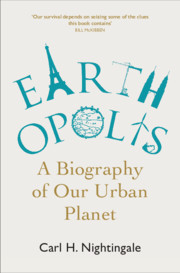Book contents
- Earthopolis
- Earthopolis
- Copyright page
- Dedication
- Contents
- Figures
- Maps
- Introduction Our Urban Planet in Space and Time
- Prologue Before and Beyond: Big Things in Tiny Places
- Part One Cities of the Rivers
- Part Two Cities of the World Ocean
- Part Three Cities of Hydrocarbon
- Chapter 10 Chimneys to Smokestacks
- Chapter 11 Planet of the People I: The Atlantic Cauldron
- Chapter 12 Planet of the People II: Feminists, Abolitionists, and los liberales
- Chapter 13 Weapons of World Conquest
- Chapter 14 Capitalist Explosions
- Chapter 15 The Pharaohs of Flow
- Chapter 16 Planet of the People III: An Urban Majority Takes Its Space
- Chapter 17 Lamps Out
- Chapter 18 The Labyrinths of Terror
- Chapter 19 Gathering Velocities I: Tailpipe Tracts and Tower Blocks
- Chapter 20 Gathering Velocities II: Liberation and “Development”
- Chapter 21 Greatest Accelerations I: New Empires, New Multitudes
- Chapter 22 Greatest Accelerations II: Shacks and Citadels
- Chapter 23 Greatest Accelerations III: Pleasure Palaces and Sweatshops
- Chapter 24 Great Accelerations IV: Maximal Hydrocarbon, Maximal Waste
- Chapter 25 2020 Hindsight … and Foresight?
- Acknowledgments
- Notes
- Index
Chapter 22 - Greatest Accelerations II: Shacks and Citadels
from Part Three - Cities of Hydrocarbon
Published online by Cambridge University Press: 10 May 2022
- Earthopolis
- Earthopolis
- Copyright page
- Dedication
- Contents
- Figures
- Maps
- Introduction Our Urban Planet in Space and Time
- Prologue Before and Beyond: Big Things in Tiny Places
- Part One Cities of the Rivers
- Part Two Cities of the World Ocean
- Part Three Cities of Hydrocarbon
- Chapter 10 Chimneys to Smokestacks
- Chapter 11 Planet of the People I: The Atlantic Cauldron
- Chapter 12 Planet of the People II: Feminists, Abolitionists, and los liberales
- Chapter 13 Weapons of World Conquest
- Chapter 14 Capitalist Explosions
- Chapter 15 The Pharaohs of Flow
- Chapter 16 Planet of the People III: An Urban Majority Takes Its Space
- Chapter 17 Lamps Out
- Chapter 18 The Labyrinths of Terror
- Chapter 19 Gathering Velocities I: Tailpipe Tracts and Tower Blocks
- Chapter 20 Gathering Velocities II: Liberation and “Development”
- Chapter 21 Greatest Accelerations I: New Empires, New Multitudes
- Chapter 22 Greatest Accelerations II: Shacks and Citadels
- Chapter 23 Greatest Accelerations III: Pleasure Palaces and Sweatshops
- Chapter 24 Great Accelerations IV: Maximal Hydrocarbon, Maximal Waste
- Chapter 25 2020 Hindsight … and Foresight?
- Acknowledgments
- Notes
- Index
Summary
Chapter 22 of Earthopolis: A Biography of Our Urban Planet is the second in a four-chapter series on the Greatest Acceleration from 1945 to the present. It focuses on the intensifying worldwide struggle over urban land and housing. As a billion migrants from the countryside joined rapidly expanding urban populations, enormous largely self-built cities of the poor grew on the peripheries of the world’s cities, especially in the Global South. There, the sheer numbers of poor migrants met up against states eager to transform cities into exemplars of national and developmental prowess and global finance and real estate capitalists eager to make profit on urban land – above all by developing luxury enclaves for elites and the middle class. As land prices soared and urban real estate became the second-most lucrative form of global investment, these elites weaponized a long-standing vocabulary of contempt for the poor, centered on words like “slum” and “informality.” While diminishing their stocks of affordable state housing, they also justified massive waves of “slum clearance” in the name of sanitation and “beautification.” Their goal was to create “World Cities” capable of attracting investment from prominent capitals of global capital such as New York, London, and Tokyo.
Keywords
- Type
- Chapter
- Information
- EarthopolisA Biography of Our Urban Planet, pp. 552 - 583Publisher: Cambridge University PressPrint publication year: 2022



